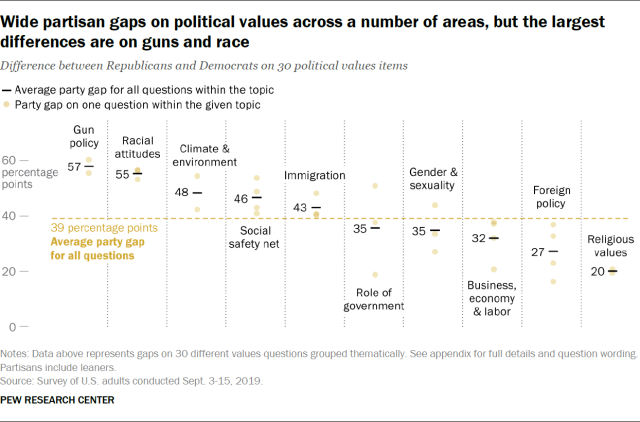As the climate in politics continues to ramp up heading towards the general election in November 2020, partisanship remains the most prominent differentiating factor among U.S. presidential candidates this election cycle, a recent survey shows.
According to the survey, conducted by Pew Research Center, wide partisan gaps on certain political values and topics exists, with gun policies, racial disparities, and climate change at the top of the list.
The study recruited close to 9,900 adult participants from the online American Trends Panel.
From the study, both Republicans and Democrats have turned most of their focus on the topic of gun control and racial discrimination, more than illegal immigration, sexuality, economy and labor, and religious values, the survey indicated.
“The issues that divide the partisan coalitions are different for Republicans than for Democrats,” the findings showcased. “Age differences are generally wider among Republicans than Democrats – particularly in opinions about foreign policy, immigration and homosexuality – while educational attainment is a bigger divider among Democrats.”
“Democrats also are divided by race, with black Democrats much more likely than white Democrats to associate belief in God with morality and less likely to say that same-sex marriage has been good for society. Racial differences in attitudes are far less consequential for Republicans, who are predominantly non-Hispanic white.”

Political values vary by age groups; mid-aged adult Republicans have contrasting views on the most widely discussed topics in the survey compared to those under the age of 50. For Democrats the age divide is more modest. Among the younger Republicans, most participants discerned peace as the result of good diplomacy through negotiation strategies. Meanwhile, older Republicans, viewed peace as a sequence of military strength.
“The age differences are about as large in opinions about the impact of newcomers from other countries, whether stricter environmental laws are worth the cost and whether legalizing same-sex marriage has been a good thing for the United States,” the survey also found.
Moreover, in the survey, researchers determined that the majority of voters viewed U.S. corporations as too powerful, with Democrats more likely to solidly hold this belief than Republicans. On military strategy, American voters maintained the notion that the U.S. should continue its path as a global military superpower, with more Democrats praising the concept of another country becoming as militarily powerful as the U.S., in comparison to Republican respondents.
Overall, the survey sheds new light on what current issues the American public are favoring and how wide the partisan gaps are on these topics. But the findings are only a glimpse of what we might see as voters head for the polls to re-elect or sit a new leader into federal office on November 3rd, 2020.


